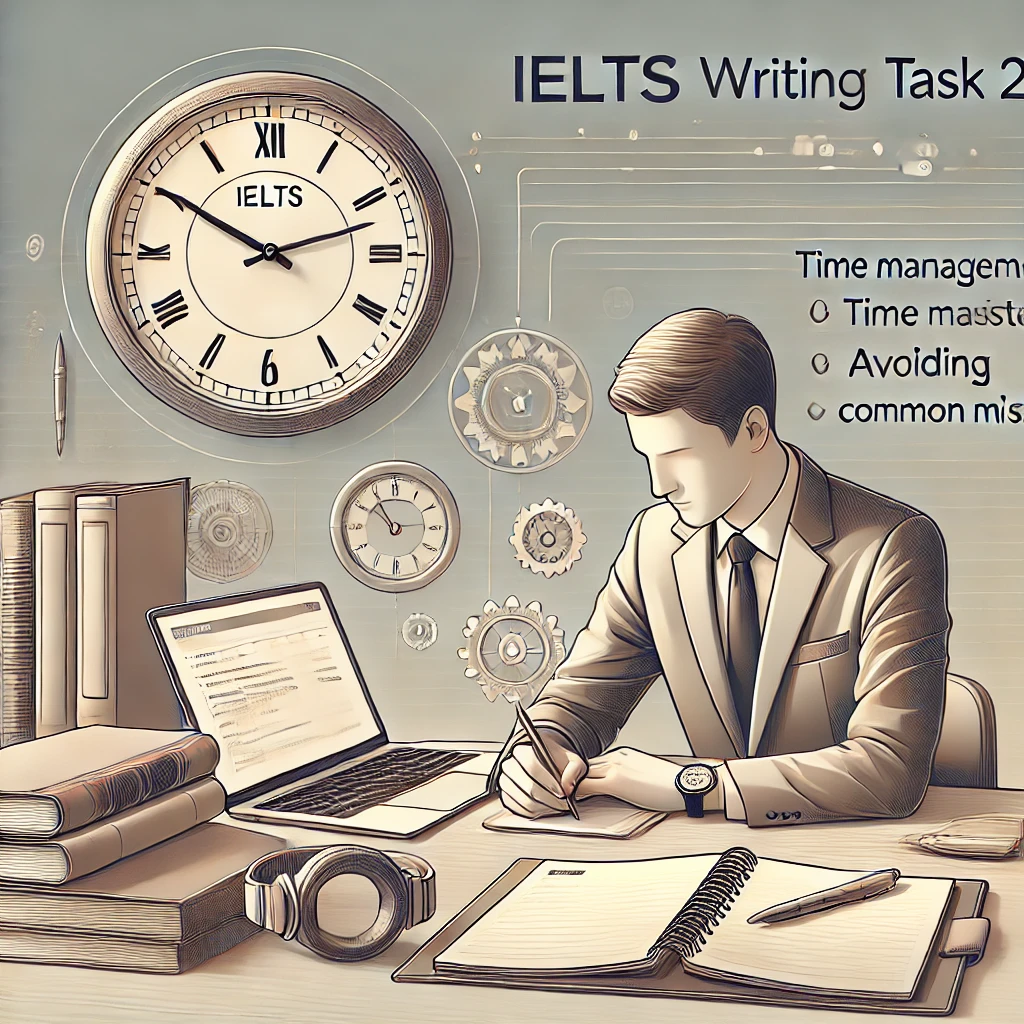Currently Empty: ر.ق 0,00
IELTS
Top 10 Mistakes to Avoid in the IELTS Writing Task 2

The IELTS Writing Task 2 is often considered the most challenging part of the exam. This section requires you to write a well-structured essay in response to a specific question within 40 minutes. Many candidates struggle to achieve their desired band score due to common mistakes that can easily be avoided. In this guide, we’ll discuss the top mistakes to avoid in Writing Task 2 and how to overcome them.
1. Misinterpreting the Question
Why It Happens:
• Failing to read the question carefully
• Misunderstanding the task type (e.g., opinion essay, discussion essay, or problem-solution essay)
How to Avoid It:
• Take a minute to thoroughly read the question and underline key terms such as “advantages,” “disadvantages,” “opinion,” or “discuss.”
• Identify the task type and ensure your essay addresses all parts of the question.
Example:
If the question asks, “Discuss both views and give your opinion,” your essay must:
1. address both perspectives.
2. clearly state your own opinion.
3. support your opinion with reasons and examples.
2. Not Answering All Parts of the Question
Why It Happens:
• Over-focusing on one part of the question while neglecting others
How to Avoid It:
• Break the question into parts and create a brief outline before writing.
• Make sure each paragraph addresses a specific aspect of the question.
Example:
For a problem-solution essay:
• one paragraph should describe the problem.
• another should propose solutions.
• avoid spending the entire essay describing the problem alone.
3. Poor Essay Structure
Why It Happens:
• Writing without a clear plan
• Mixing ideas in a single paragraph
How to Avoid It:
• Stick to the standard essay structure:
o Introduction: Introduce the topic and state your position.
o Body Paragraph 1: Present your first main idea with examples.
o Body Paragraph 2: Present your second main idea with examples.
o Conclusion: Summarize your points and restate your position.
Pro Tip:
Use cohesive devices like “Firstly,” “Moreover,” “However,” and “In conclusion” to guide the reader through your essay.
4. Weak Thesis Statement
Why It Happens:
• Writing vague or unclear introductions
• Failing to clearly state your opinion or the essay’s purpose
How to Avoid It:
• Write a concise thesis statement that directly answers the question.
Example:
Question: “Do the advantages of online education outweigh the disadvantages?” Weak Thesis: Online education has pros and cons. Strong Thesis: While online education offers flexibility and accessibility, its drawbacks, such as lack of interaction and technical issues, outweigh its benefits.
5. Repetition and Redundancy
Why It Happens:
• Repeating the same ideas due to limited vocabulary
• Overusing phrases like “I think” or “In my opinion.”
How to Avoid It:
• Use synonyms and paraphrasing to vary your language.
• Expand your vocabulary by learning topic-specific words.
Example:
Instead of repeating “advantages,” use terms like “benefits,” “positive aspects,” or “merits.”
6. Grammatical Errors
Why It Happens:
• Writing complex sentences without grammatical accuracy
• Making common mistakes with verb tenses, subject-verb agreement, or articles
How to Avoid It:
• Write simple, grammatically correct sentences rather than over-complicating them.
• Review basic grammar rules and practice writing error-free sentences.
Pro Tip:
Focus on using a mix of simple, compound, and complex sentences to showcase your grammatical range.
7. Insufficient Development of Ideas
Why It Happens:
• Listing points without elaborating or providing examples
• Rushing through paragraphs without depth
How to Avoid It:
• Support each main idea with at least one example or explanation.
• Use real-life examples, statistics, or hypothetical scenarios to strengthen your arguments.
Example:
Weak Development: Online education is flexible. Strong Development: Online education allows students to learn at their own pace. For example, working professionals can balance their studies with job responsibilities.
8. Poor Time Management
Why It Happens:
• Spending too much time planning or writing the introduction
• Leaving little time for proofreading
How to Avoid It:
• Allocate your 40 minutes wisely:
o 5 minutes: Plan your essay and outline ideas.
o 30 minutes: Write your essay.
o 5 minutes: Proofread and check for errors.
9. Ignoring Word Count Requirements
Why It Happens:
• Writing too few words (<250), leading to penalties.
• Writing excessively long essays (>300 words) results in losing focus.
How to Avoid It:
• Aim to write between 260-280 words.
• Practice writing essays within this range during preparation.
10. Lack of Proofreading
Why It Happens:
• Running out of time
• Overlooking the importance of reviewing your work
How to Avoid It:
• Always allocate a few minutes at the end to check for:
o Grammar and spelling mistakes.
o Repeated words or ideas.
o Missing punctuation or awkward sentences.
Pro Tip:
Use proofreading techniques like reading your essay backward to pinpoint errors you might miss.
Avoiding these 10 common mistakes in IELTS Writing Task 2 can significantly improve your band score. Focus on understanding the question, structuring your essay effectively, and developing your ideas with clarity and depth. Regular practice, along with expert feedback from programs like those offered at IFI IDP Qatar, can help you refine your writing skills and achieve your desired score.
Remember, success in Writing Task 2 is not just about writing more but it is about writing better. Start practicing today and take one step closer to achieving your IELTS goals!
All the best with your IELTS preparation!




Max
My writing always suffers from an insufficient development of ideas. 😉
Huda
Very helpful.
Amna
Helpful, thanks.